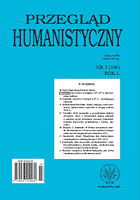METAFORY FASZYZMU (O POLSKICH KONCEPTUALIZACJACH WŁOSKIEJ DOKTRYNY)
THE METAPHORS OF FASCISM (ON POLISH CONCEPTUALISATIONS OF MUSSOLINI’S DOCTRINE)
Author(s): Monika BednarczukSubject(s): Cultural Essay, Political Essay, Societal Essay
Published by: Wydawnictwa Uniwersytetu Warszawskiego
Keywords: faszyzm; metaforyka faszyzmu; wizje włoskiego faszyzmu w Polsce;
Summary/Abstract: The Polish discourse of Fascism has been analysed mostly by historians and political scientists who used to focus on the interpretations made by individual economists, politicians or ideologically engaged writers of the inter-war period. The aim of the paper is, by contrast, to present the diversified Polish ways of understanding Italian Fascism from the point of view of metaphors. The author takes as her starting point the idea of cognitive grammar that stresses the role of metaphors as a key mechanism categorising the world-view. The analysis of the most frequent metaphors reveals two basic ways of understanding Fascism in Poland: the dominant imaginings are concentrated on the metaphors of necessary ‘healing’, ‘saving’/‘salvation’, ‘cleaning’/‘purifying’ and ‘restoring’ the proper, previous status quo. It prefers the image of ‘patients’ to that of ‘victims’. ‘Violence’ is a rather avoided term. The discourse inspired by the ‘original’ Italian Fascists – Futurists – which was full of imagined acts of agression against the civilization and the governing generation, finds only few admirers and imitators in Poland (above all A.M. Swinarski). The analysis proves that the doctrine was subjected to different processes of ‘adapting’ it to the specific Polish tradition, to the ‘national character’ and political situation also at the (in a way crucial) linguistic level.
Journal: Przegląd Humanistyczny
- Issue Year: 432/2011
- Issue No: 01
- Page Range: 17-31
- Page Count: 15
- Language: Polish
- Content File-PDF

